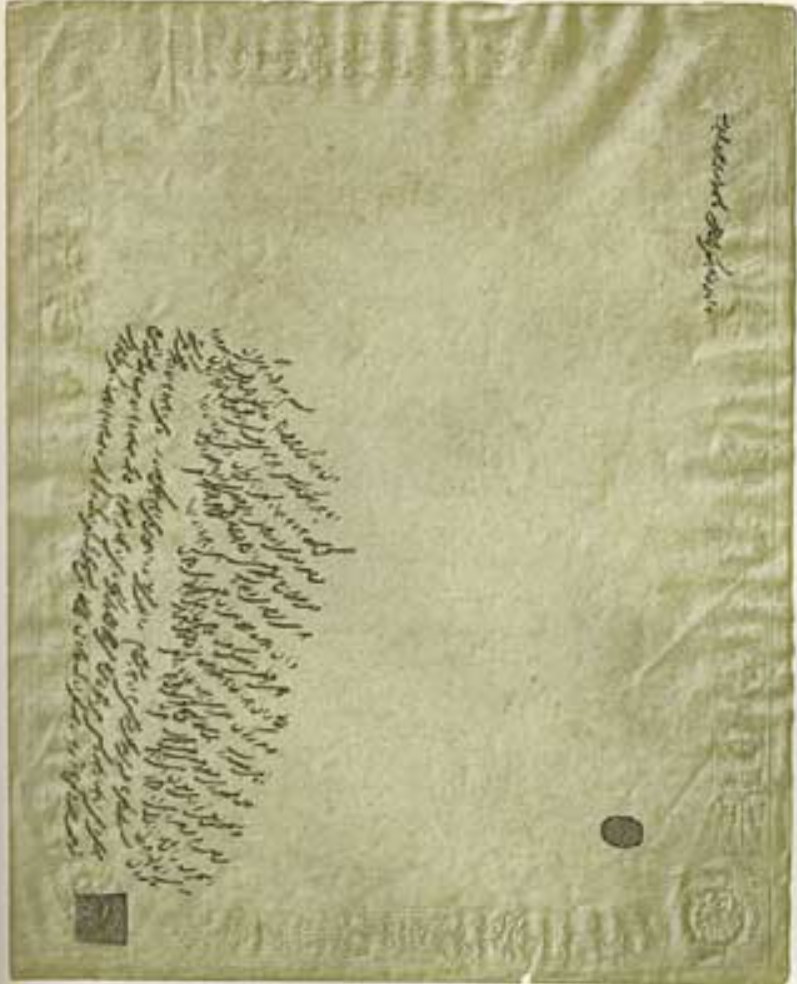
The Tablet of the Bab to the 18th Letter of the Living, Quddus -
Facsimile text from Muhammad Zarandi, Nabil-i A`zam, Tarikh/ Shoghi Effendi, The Dawn-Breakers (1st ed. 1932)
The Tablet to the Eighteenth Letter of the Living,
Muhammad `Ali Bārfurushi, Quddus (the Most Holy) (d. Bārfurush/Babol, 1849).
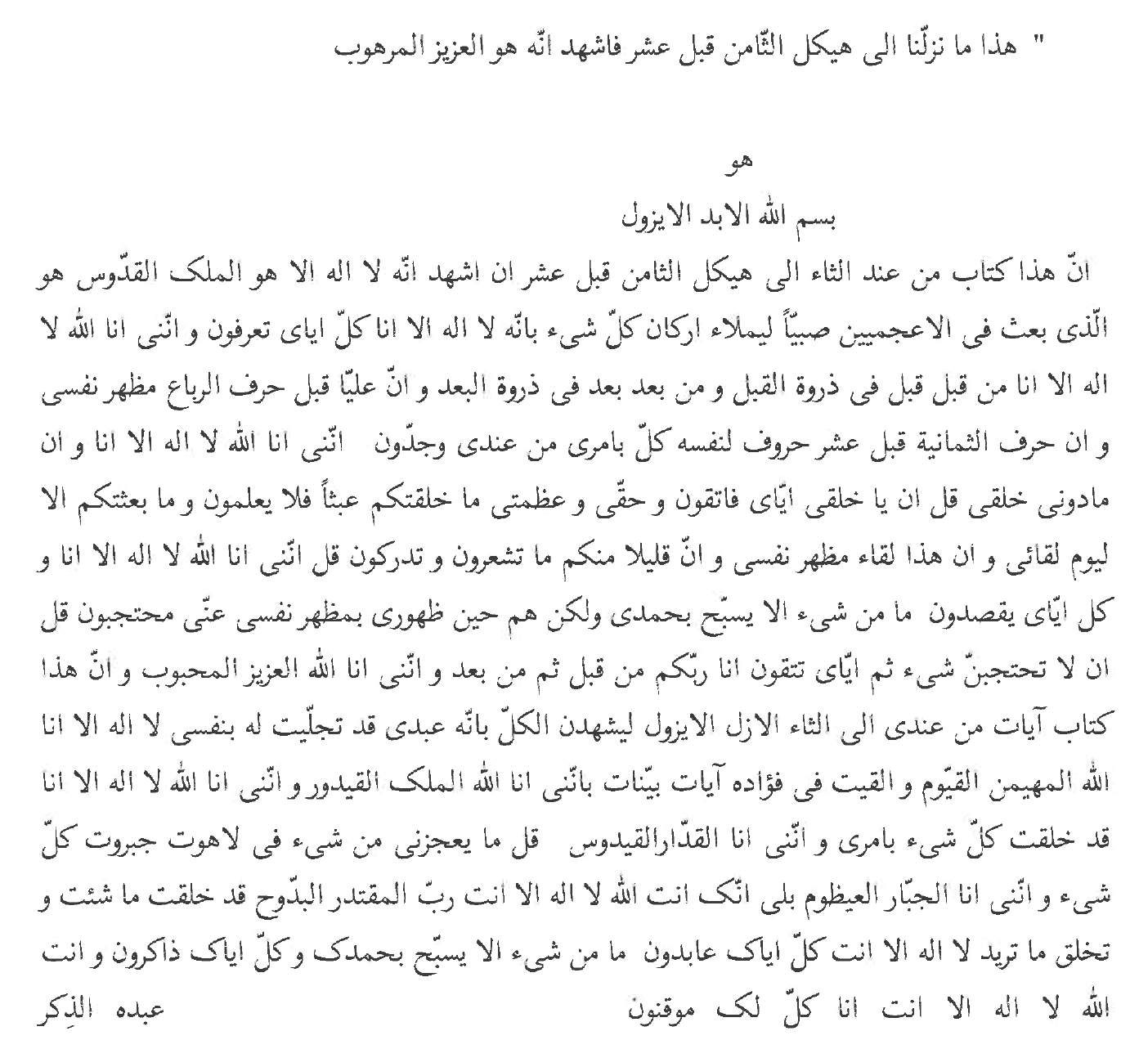
Typed text deriving from`Abd al-Hamid Ishrāq Khāvarī and Sa`īd Raḍavi as printed in Hooshmand Dehqān, Ganj-i Pinhān: Sar Gudhasht wa āthār-i Jināb-i Quddūs (Adel Publishers, 2016). p.8.
Introduction, Notes and Translation Stephen Lambden, UC Merced.
In Progress Last updated 08-06-2021
This brief Arabic Letter or scriptural Tablet reproduced above and translated below was addressed to Muhammad `Ali Barfurushi, entitled Quddūs (the Most Holy) (b. Bārfurush c. 1328/1822 - d. near Barfurush-Babol, 23rd Jumadi II 1265 / 16 May 1849), the most important, most lofty and last (18th) of the elevated eighteen disciples of the Bab known as the first Vahid or Ḥurūf al-Ḥayy, the `Letters of the Living' (Ar. Hayy = H+Y = 10+8 = 18). This letter or Tablet to Quddūs apparently as a `Letter of the Living', opens with the standard (in Babi-Baha'i and other writimgs) "Huwa" indicating "He is God" and has a brief, introductory prolegomenon stating that it was revealed by the Bab for the Haykal - the Temple / Person of the Eighteenth `Letter of the Living', An additional line refers to God, the Bab or Quddūs as one Mighty or Noble (al-`azīz) as well as one ultra-pious, Godfering or Ascetic-Monastic (marhūb). cf. the Arabic rāhib, "monk"). This latter attribute may well indicate Quddus as one renowned for his great piety and holiness, his sometimes isolated spiritual withdrawal.
Lambden Beta Translation - Last updated 08-06-2021.
This is that which We revealed for the Eighteenth Temple [Letter of the Living = Quddūs]. So bear thou witness that He is the Mighty -Noble (al-`azīz), One Awesome-Ascetic-Monastic-Godfearing (al-marhūb).
He is [God]
In the name of God, the Most Eternal, the Pre-Eternal
(bismi’llah al-abad al-izā[ū]l).
[I]
This is a book (kitāb) [letter] from the letter al-thā’ 1 [= thamarah = the Fruit = the Bāb] unto the 18th Temple (haykal) [= Muhammad `Alī, Quddūs, the Most Holy]. I bear witness that He, no God is there except Him, the King (al-malik), the Most Holy (al-quddūs). He is the One Who commissioned among the Persians a Youth (fi'l-`ajamiyyin ṣabiyy an) [= the Bab / Quddus] to the end that He might fill the pillars of all things (arkān kulli shay’) with [the cry] “Verily He, no God is there except I myself" for all should be aware of Myself. And I verily, I am God! (innani anā Allāh) no God is there except I myself. This before any before relative to the very essences ["atoms", or dhurwa "uttermost acme"] of antecedence [“beforeness”] (min qabl qabl fī dharrat [dhurwa] al-qabl) as well as after the after within the very essences ["atoms", or dhurwa "uttermost acme"] of futurity [“afterwards”] (min ba`da ba`da fī dharrat [dhurwa] al-ba`da).
[II]
`Alī before the Quadruple Configuration [ḥarf al-rubā’ رباع , rubā` = 1-M 2-H 3-M 3-D = Muḥammad = the Bāb) is the Manifestation of Myself (maẓhar nafsī) while the Eighteenth Letter (of the Living = Quddūs) among the Letters [of the Living] is [even as] Mine Own Self (li-nafsihi). At My Command, as a result of My Command, do all derive existence! I, verily am God, no God is there except I Myself. Whatsoever is other than Me, is My creation.
[III]
Say: O My creation!
Ye shall all fear Me, My Divine Reality (ḥaqqī), My Omnipotence (`aẓimatī)! I did not create thee as a mere plaything (`abathan). He did not instruct thee, nor did I commission thee, save for the Day of the Encounter (liqa') with Me! This is the Meeting with the Manifestation of Mine own Logos-Self (liqā’ maẓhar nafsī) [the Bab]. But for a very few (qalīl an) among you, there shall be neither understanding nor comprehension!
[IV]
Say: I Indeed am God! No God is there except I myself and all should direct themelves towards Me! There is no single thing but that it should offer glorification (s-b-ḥ) through my laudation (ḥ-m-d) yet shall these realities at the moment of my theophany [manifestation] (ẓuhūr), by virtue of the manifestation of Myself (maẓhar nafsihi), remain entirely veiled therefrom.
[V]
Say: Nothing at all should remain veiled for all should show piety [be God-fearing] before Me since I was thy Lord aforetime as well as in the hereafter. I Indeed, I am God, the Mighty, the Beloved (al-`azīz al-maḥbūb)!
[VI]
This book (kitāb) [letter, Tablet] contains verses (al-āyāt) from Myself unto the Letter thā’ of Eternaled Pre-Eternity [= thamarah al-azal al-īzūl) [sic.] to the end that all may bear witness that he [Quddus] is My servant (`abdī). I [the Bab] divulged My glory (tajallyyat) unto Him through Mine own Logos-Self/Myself (nafsī) for there is no Deity except I Myself, God, the Help in Peril, the Self-Subsisting (al-muhayymīn al-qayyūm). I did cast into his [Quddus'] inmost heart (fū’ād) [such] expository verses (āyāt bayyināt), as, “I [Quddus] indeed am God the Ruler (al-malik) Almighty [sic] (al-qaydūr), I indeed am God, no God is there except I Myself. I created everything through My Command (bi-amrī) for I am indeed the Foreordainer (al-qaddār), the Sanctified (al-qaydūs)!
[VII]
Say: Nothing can compromize mine inimitability within the Divine Realm (lāhūt), within the Omnipotent Domain (jabarūt) of everything (kull shay’). I [the Bab], verily, am the Omnipotent Ordainer (al-jabbār), the Supremely Great [sic.](al-`ayẓūm). Yet of a certainty (balā)! Thou [Quddūs] art indeed God, no God is there except Thee, the Supremely Powerful Lord (rabb al-muqtadir), the One of Talismanic Potency (al-badūḥ = 2-4-6-8)! Thou createth whatsoever thou willeth and thou will create whatsoever thou desireth. No God is there except thee. All should be worshipful of thee. There exists nothing but that it should offer glorification through the Praise of thyself. All should be especially mindful of thee. Thou art indeed God! No God is there except Thee. Before thee we are all in a state of certainty!
[Sealed] His servant (`abd), the Remembrance (al-dhikr).
♦
Select Expository Notes
This Translation is based on the an original facsimilie in the handwriting of the Bab published by Shoghi Effendi in his recreation of Nabil-i Zarandi's unpublished multi-volume Tarikh re-entitled The Dawn-Breakers... (1st ed. 1932). I have also had the befefit of consulting an Arabic transcription of the Dawn-Breakers facsimilie by Muhammad Afnan (d. Canada, 2018) as well as the Arabic text deriving from `Abd al-Hamid Ishrāq Khāvarī and Sa`īd Raḍavi as printed in Sar Gudhasht wa āthār-i Jinab-i Quddūs (Intishārāt-i `Ādil, 2016) page 8 by Hooshmand Dehqān (see image above).
The Heading or Prescript.
This is that which We revealed for the Eighteenth Temple [Letter of the Living = Quddūs]. So bear thou witness that He is the Mighty [Noble] (al-`azīz), One Awesome [Ascetic-Monastic] (marhūb).
In the Qur'an words derived from the Arabic root r-h-b occurs a few times in verbal and nominal forms. Its basic verbal sense being `to be in awe or fear [of God]'. See Q. 7:154 which refers to those who hold their Lord in awe" as well as Q, 2:40 and 16:51 for the imperative irhab. In Q. 21:90; 28:32 and 59:13 we find the verbal use of rahb, rahab and rahbah which carries the senses of awe and fear. In Q. 57:27 reference is made to rahbaniyya meaning "monasticism" viewed as an invented form of Christian piety. There are three references to ruhban, namely "monks" (singular rāhib = "monk") in the Qur'an, one of them positive (Q, 3:82; 9:31, 34). Note also the 4th ( to cause fear, terrify) and tenth forms (also indicating inner terror or fear) of this triliteral root r-h-b at Q. 8:60 and 7:116 (I draw here on Kassis, Concordnce. p. 1000). The word used by thr Bab in the prescript heading following the al-`Aziz ( the All-Mighty) is al-marhūb which probably refers to God and/or most probably to Quddus as "the Awesome" or the One Given to Pious Asceticism". Al-marhūb is not found in the Qur'an itself.
Relative to the last word marhub in the heading above are a few verses in Qayyum al-asma' VIII [8] in the Surat al-Sirr (The Surah of th Divine Mystery) or the Surat al-Tawhid (The Surah of the Divine Unity) in which the Bab interprets the name Joseph, Arabic Yusuf. He also comes to use the word رهباناً rahbān an, perhaps of himself as one awesome or "monastic" (probably not the plural monks, rúhbān an). Thus we read at Qayyum al-asmā' VIII [8]: 31f (versification uncertain):
و انّ اللّه قد اراد باسم يوسف كلمتنا العلیّ الّذی قد كان حول النّار مشهوداً ه هو الّذی يرسل عليكم آياته باذن اللّه خائفا علی الحقّ و بالحقّ رهباناً تذكرة لمن شإ ان يذكرّ او يخشی عن الرّحمن فی حكمه الحقّ الّذی قد كان بالحقّ مقضيّاً ه
[31] By the name Joseph God, verily, intended Our Exalted Word (al-kalimat al-akbar), made manifest in the vicinity of the [Sinaitic, theophanic] Fire (al-nār). [32] He, verily is the one who, by the leave of God, sent His verses unto thee in truth, in a state of fear (khā'if an), in very truth one Awesome-Monastic God-fearing (rahbān an) an object of admonition (tadhkira) for such as might be mindful or fearful of the All-Merciful (al-rahman) as accords with His wisdom (hikma) which is the Truth regarding such as hath ever been, in very truth, so ordained (maqdiyy an).
[33] He is the One Who hath taught you [pl.] of such of His signs as the genesis of the hereafter (nash'at al-akhira) perchace the people might, in very truth, be content with God and with His signs. [34] So, by the Lord of the heaven and of the earth, He, verily, is the True One from Us and He, verily, took Our covenant (`ahd) by the leave of God with all the worlds, mayhap the people would say: `If God in His absence hath sent a man [or: `herald of good tidings'] ) unto Us, His Remnant (baqiyyat), then We did but follow him and have been guided by his judgement unto the True One Who is rightly guided."
Paragraph [I]
Note 1 = the thamarah (Fruit) is here the Fruit of the Tree of Reality, namely the Bāb] unto the 18th Temple (haykal), namely the Letter of the Living Muhammad `Alī, Quddūs (the Most Holy). The Bab himself uses the title al-thamarah as did Mirza Yahya Subh-i Azal.
Paragraph [I] - Translation.
"He is the One Who commissioned [raised up] a Persian (al-`ajamiyyin ṣabiyy an) to the end that He might fill the pillars of all things (arkān kulli shay’) with [the cry] “Verily He, no God is there except I myself" for all should be aware of Myself. And I verily, I am God! (innani anā Allāh) no God is there except I myself.
It is less likely that the Bab is referring to two youths here - himself as well as Quddus - as al-`ajamiyyayn ṣabiyy an) as ṣabiyy is a an Arabic singular. A less likely translation would be, "He is the One Who commissioned [raised up] two Persians (al-`ajamiyyayn ṣabiyy an), a Youth[s] [the Bab and/or Quddus] to the end that He might fill the pillars of all things (arkān kulli shay’) with [the theophanic cry] “Verily He, no God is there except I myself [or “We two” /“Us both”] for all should be aware of Myself. And I verily, I am God! (innani anā Allāh) no God is there except I myself [Us two]",
A possible echo of Ḥusayn ibn Manṣūr al-Ḥallāj'
Ḥusayn ibn Manṣūr al-Ḥallāj' (b. al-Bayḍā', Fars, Persia (b. Ṭur near Baydā, c.244/858- d. executed Baghdad, 309/922), was a Sufi disciple of the Sahl al-Tustari (d. 283/896) especially famous for his theophanic cry أنا الحق Anā al-Ḥaqq "I am The Truth [God]". The following line (at the end of line or paragraph I) of the Tablet to Quddus has a close connection with some sentences in the poetical Arabic Kitāb al-ṭāwāsīn ('The Books of the Ta' ("T") and the Sin ("S")' of al-Ḥallāj' :
And I verily, I am God! (innani anā Allāh) no God is there except I myself. This before any before relative to the very essences ["atoms", or dhurwa "uttermost acme"] of antecedence [“beforeness”] (min qabl qabl fī dharrat [dhurwa] al-qabl) as well as after the after within the very essences ["atoms", or dhurwa "uttermost acme"] of futurity [“afterwards”] (min ba`da ba`da fī dharrat [dhurwa] al-ba`da).
Towards the beginning (section 8f in some editions) of the Kitāb al-ṭāwāsīn, al-Ḥallāj (loosely translated) celebrating the greatness of the Prophet Muhammad he writes,
لم يزل كان مشهوراً قبل الحوادث والكوائن والاكوان ولم يزل كان مذكوراً قبل القبل و بعد البعد والجواهر والاكوان
For all Eternity was he was evident (mashhur an) before the events (hawadith), the realities (al-kawa'in) and the Beings (al-akwan)!
"For all Eternity was He recollected (madhkur an) before the before (qabl al-qabl) and after the after (ba`d al-ba`d) and the Essences (al-jawahir) as well as the Beings (al-akwan)!
See al-Hallaj, Diwan ,,, Germany: al-Kamal Verlag, 1997, p.120.
Add refs. Jawid Mojaddedi `ḤALLĀJ, ABU’L-MOḠIṮ ḤOSAYN b. Manṣur b. Maḥammā Bayżāwi' EIr, Vol. XI, Fasc. 6, pp. 589-592/ https://iranicaonline.org/articles/hallaj-1
Louis Massignon (1883-1962). La Passion de Husayn Ibn Mansûr al-Hallâj 4 vols. Paris, 2nd ed., 1975.
Paragraph [II] = `Ali Muhammad the Bab and Muhammad Ali Quddus.
In a way the Bab and Quddus are a kind of syzygy, a union of contrary realities for their names are identical yet the reverse of each other.
"Alī before the Quadruple Configuration (ḥarf al-rubā`) [= 1 M -2 H -3 -M 4 -D], `Ali Muḥammad, the Gate of God] = the Bāb) is the Manifestation of Myself (maẓhar nafsī)".
The phrase ḥarf al-rubā’ , the letter, locus, configuration which is "fourfold" or 273 = abjad ` Ali Muhammad, the Gate of God',
In the seventh directive of the Khasā’il al-sab`ah (The Seven Directives) of th Bab we read:
[7] And the seventh of them involves the wearing of the white carnelian signet-ring (al-takhtam bi'l-khātam al-`aqīq al-abyāḍ) [with the following words] engraved thereon, `There is no God, but God. Muhammad is the Messenger of God (rasūl Allāh) -- ص [Ṣ]-ع [c] [may blessings be upon him] -- `Alī is the Wālī-Allāh ("The Legatee of God")-- ص [Ṣ]-ع [c] [may blessings be upon him] -- 273.”
The number 273 - the abjad of rubā` (200+2+1+70 = 273) in the above paragraph is the abjad numerical equivalent of the words: 'Alī [= abjad 110] Muhammad [= abjad 92], Bāb Allah (“the Gate of God)’ [abjad, = 5+66]; total 110 + 92 + 5 ++ 66 amounts to 273. In summing up his claims in his late Kitāb-i Panj sha’n, the Bab uses the cryptic word, designation or `title’ رباع , rubā`, a word meaning (loosely) `fourfoldness’ (cf. the poetical word quatrain). This word رباع also has a numerical value totalling 273; r = 200 + b = 2 + a = 1 + `[ayn] = 70; total = 273:
“Thou [God] indeed manifested Me after two years (sunayn) as one rubā` (“fourfold”) by means of a [personal] name (ism) [= `Alī Muhammad = 92+110 = 202 ] which Thou [God] did indeed associate with the number al-hā’ –“h” which has an abjad numerical value of five like the word Bāb (B+ā+b – 2+1+2 = 5)” (KPS. I. 2. p. 61).
The name of the Bab and of Quddus also when reversed is 'Alī [= abjad 110] Muhammad [= abjad 92], When this is linked with Bāb Allah (“the Gate of God)’ [abjad, = 5+66] the result is 110 + 92 + 5 + 66 again 273. This is alluded to in this Tablet of the Bab to Quddus.
Paragraph [VII] The One of Talismanic Potency (al-badūḥ = 2-4-6-8)!
Say: Nothing can compromize mine inimitability within the Divine Realm (lāhūt), within the Omnipotent Domain (jabarūt) of everything (kull shay’). I [the Bab], verily, am the Omnipotent Ordainer (al-jabbār), the Supremely Great [sic.](al-`ayẓūm). Yet of a certainty (balā)! Thou [Quddūs] art indeed God, no God is there except Thee, the Supremely Powerful Lord (rabb al-muqtadir), the Seal of Talismanic Potency (al-badūḥ = 2-4-6-8)!
بدوح Badūḥ / Budūḥ, the Abjad Letters 2-4-6-8, A potent occult neologism used in forming a threefold magic square.
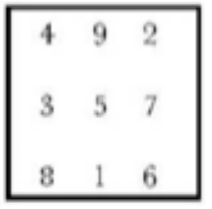
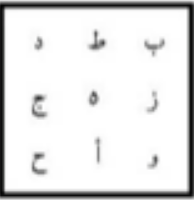
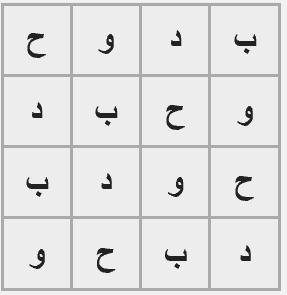
Badūḥ : the Threefold Magic Square(s) and another Fourfold talismanic inscription.
The Islamic Background
The word badūḥ is derived from the abjad succession of the first four even numbers/letters. It follows the well-known abjad system of letter-number configuration. See EIr. Abjad. In Islamic talismanry and associated magic squares (waqf al-a`dad) badūḥ has been associated with Adam or the first couple and with the "seal" of the Israelite king Solomon (fl. 10th cent BCE). It can allegedly actualize (among other things) the power of the speedy communication of data or messages, be of benefit at childbirth. and
Jabir ibn Hayyan
The Rasa'il Ikhwan al-safa' (Treatises of the Brethren of Purity)
In his Munqidh min al- Dalal (The Deliverance from Error), `Abd al-Hāmid al-Ghazali (1058–1111) refers to two threeold (3x3) magic squares (see the two image above) yielding fifteen in all directions. They were reckoned, when "inscribed on two pieces of cloth untouched by water" to be useful in treating cases of difficult childbirth.
A work is attributed to Abd al-Hāmid al-Ghazali (1058–1111) entitled الاوفاق للغزالى
Abraham ben Meir ibn Ezra (c. 1090-1167) Hebrew and Arabic
al-Būnī = البوني = `Abu al-`Abbas Ahmad ibn `Ali ibn Yūsuf al-Qurayshī, Muḥyī al-Dīn al-Būnī (d. Cairo, c. 622/1225 or slightly later)
An Islamic theologian, mystic and magician, Ahmad ibn `Alī al-Būnī. wrote around 40 Arabic books on Islamic esoterica and related subjects. He had a special facility with the theology of occult or talismanic configurations of the Names of God and number-letter magic squares. Most of his often complex work remains unedited, unstudied and unpublished, save for a few more or less non-critical editions. His Kitāb shams al-ma`arif wa latā'if al-awārif ("The Book of the Sun of Gnosis and the Subtleties of Elevated things").... exists in several recensions of different lengths.
The intricacies of al-Būnī's Shams al-ma`ārif were known to Shaykh Ahmad al-Ahsā'ī. He answered some difficult questions about aspects of it in his erudite al-Risāla al-Rashtiyya (1226/1811 see Jawāmi` al-kilam 1/2:63-114; lbrāhimī, Fihrist, No. 104 p,260f; Momen, BSBM 1: 113). There is little doubt that theologically profound aspects of the writings of al-Būnī directly or indirectly influenced the architects of what became Shaykhism which the Bāb may have come to know or have studied in his youth. It will be seen below that al-Rashtī's commentary on the graphic form of the ism al-a'zam appears to have been influenced by the comments of al-Būnī in the Shams al-ma'ārif and elsewhere.
See further
- Macdonald, D. B., "Badūḥ", in: Encyclopaedia of Islam, 2nd ed. Edited by P. Bearman, et al.
- T. Canaan, The decipherment of Arabic talismans, in Berytus, iv (1937), 100 ff.
- H. Hermelink, Arabische magische Quadrates mit 25 Zellen, in Sudhojj"s Archiv far Geschichte
- der Medizin, xliii (1959), 351-4.
- L. Fischer, Zur Deutung des magischen Quadrates in Durers MELENCOLIA I, in ZDMG, ciii ( 1953), 308-14
- Denis MacEoin, ‘Nineteenth-Century Babi Talismans’, Studia Iranica 14:1 (1985), pp.77-98.
Quddus al-Badūḥ
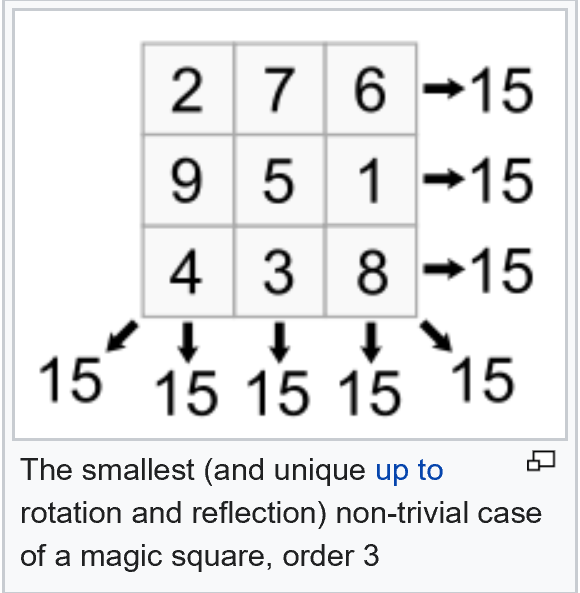
From Wikipedis `Magic Square'.
In this Tablet to Quddus, this 18th Letter of the Living is intimately associated with the Bab to the degree that he shares or mirrors his subordinate Divinity. For the Bab, Quddus is especially related to the Divine Power which is concentrated in his being as the centrally potent Talismanic Seal. He is even as a lofty transformative Seal of Talismanic Potency. Badūḥ (B+D+W+H = abjad 2+4+6+8) commences with the generative letter B (abjad 2) with its Nuqta (Point) which is the genesis of sacred writ, the fourfold all-encompassing (cf. 4 elements; 4 directions, etc) letter D (abjad 4), the last letter of the fourfold name Muhammad (M+H+M+D), the six related (3x2 = 6) letter W (abjad 6) and the letter H (abjad 8) which is the second letter of the name Muhammad and the first letter if the Name of God al-hayy (the Living One). In the threefold magic square configuration (see above) the nine letter-numbers add up to fifteen whether read vertically, horizontally or diagonally. Fiftteen is the numerical value of Hawa or Eve (h+w+a = 8+6+1 = 15). Perhaps the Bab and Quddus could be viewed as the eschatological Mother (Eve = 15) and Father (Adam = 45 = 15x3) of the new Babi era. Note also that the name of the Bab and Quddus form a kind of syzygy `Ali+Muhammad = the Bab and Muhammad+`Ali = Quddus. The central number of the al-Badūḥ magic square is 5 (see this number in the centre above)which is also the abjad value of the word Bab (B=2+A=1+B=2 total = 5).
The Elevated station of Muhammad `Ali Barfarushi, Quddus.
The Bab - Ziyarat-Namah for Quddus
This Arabic visitation Tablet commences with the new, post-Qur'anic apophatic Basmala of the Bab : "In the Name of God, the Most Inaccessible (al-amna`), the Most Holy (al-aqdas)" followed by a threefold repetition of the title of Mirza Muhammad `Ali Batfurushi, Quddus (the Most Holy), namely, Quddus. Quddus. Quddus. It reads as follows,
The Ziyarat for the Martyrs (al-shuhada'), upon them be peace. They had indeed sacrificced themselves for the Name of God al-Akhir, the Last Name of God! : Quddus! Quddus! Quddus!
In the Name of God, the Most Inaccessible (al-amna`), the Most Holy (al-aqdas).
Quddus! Quddus! Quddus!
[1] Now may al-Baha' (the Glory) from God, no God is there except Him, be upon thine inmost heart (al-fu'ad) and upon the inmost heart (al-fu'ad) of whomsoever is in thine inmost heart (al-fu'ad) as well as upon thy spirit (al-ruh) and the spirit of whomsoever is within thy spirit. So too upon thy person (nafs) and whomsoever is within thy person (nafs) as well as within thy body (jasad) and whomsoever is within thy body (jasad). [2] Then may al-`Ala' (the Exaltedness/ Exalted One) be upon thine inmost heart (al-fu'ad) and upon the inmost heart (al-fu'ad) of whomsoever He created from the Light of Thy Glorification (nur al-tasbih) ...
Trans. Stephen N. Lambden UC Merced from the Arabic text as printed in Tarikh-i Shuhada-yi Amr, ed. Muhammad `Ali Malik Khusravi Nuri, Vol.1 [Tehran : ] Mu`assat-i Milli-yi Matbu`at-i Amri, 120 Badi` / 1963-4 page 412-414. See further :
The Divinity of Quddus in the Kitab-i Panj Sha`n (Book of the Five Modes).
The Kitab-i panj sha`n (Book of the Five Modes) of the Bab is a fairly lengthy (400-500) Arabic and Persian work named after the fives modes, categories or divisions of revelation into which it is divided ([1] āyāt, revealed Arabic verses, [2] munājāt = devotional revelations, [3] khuṭbas = literary orations (very loosely "sermons") or alternatively ṣuwar ʿilmiyya = surahs expressive of divine knowledge), [4] tafsīr (scriptural commentary), and [5] fārsī = Persian revelations (see P. Bayan III:17; VI:1; IX:2, etc). It was completed over a seventeen-day period (Jumādā I, 1266/March-April, 1850) and has (in some recensions). It has XII major pentadic divisions dedicated to key disciples of the Bab, some of them hurufat al-hayy (Letters of the Living). It is in the fourth Arabic tafsir (commentary) section within its eighth division (VIII) - which is dedicated to Mulla Shaykh `Ali Turshizi (d. 1852), entitled `Azim (the Mighty) - that we find clear testimony to the elevated divine status of Quddus (see Azali, ed. 272-282). Therein we read:
So observe how it was that he came, his Eschatological Associate (sahib) and his Garment (qamits) and recite [say] : Quddūs! Quddūs! Quddūs! Quddūs! Then bear thou witness that naught is seen in the inner dimension (al-batin) thereof except the outer dimension (al-zahir) while naught is seen in the outer dimension (al-zahir) except the inner dimension (al-zahir). In the beginning (al-awwal) naught is seen except the end (al-akhir) while in the end (al-akhir) naught is seen except the beginning (al-awwal). Yea Indeed! The Name of God the al-Akhir (the Ultimate-End-Last = a title of Quddūs) shone forth, radiated, flashed lightening, and shed brilliance! So Blessed be whomsoever seeth naught therein except God! And there doth not circle around him [Quddūs] save whatsoever is beloved of God; relative, that is, to His Own Logos-Self (nafs)... (KPS. IX.4 p. 280).
The Baha'-Allah - Ziyarat-Namah for Quddus.
Baha'-Allah - the lament about Quddus in the Lawh-i kull al-ta`am *The Tablet of All-Food), c. 1854-6 :
[XIX]
[1]
Give ear, O Kamal!
to the voice of this Lowly, this Forsaken Ant, that hath hid itself in its hole, and whose desire is to depart from your midst, and vanish from your sight, by reason of that which the hands of men have wrought. [2] God, verily, hath been witness between Me and His servants. God it is Who beareth witness unto Me in all respects.
[3] So Ah! Alas! If the Last Point (nuqtat al-ukhra), the Countenance of My Love (tal`at hubbi), Quddus (the Holy One) were alive he would assuredly weep over my plight and would lament that which hath befallen me. [4] And I, for My part, would at this moment beseech his eminence and supplicate his holiness that he would enable Me to ascend unto the court of His might and recline on the cushion of his sanctity as I was wont to do in those days [now past] when I was free of the aforementioned misfortunes. [5] O Lord! Cast patience upon Me and make Me to be victorious over the transgressors.
The modern Baha'i position regarding the station of Quddus as expressed by Shoghi Effendi and others:
In his mid 20th century, centennial (1944) God Passes By Shoghi Effendi (c.1896-1957), the Guardian of the Baha'i Religion writes.
"With this historic Declaration the dawn of an Age that signalizes the consummation of all ages had broken. The first impulse of a momentous Revelation had been communicated to the one “but for whom,” according to the testimony of the Kitáb-i-Íqán, “God would not have been established upon the seat of His mercy, nor ascended the throne of eternal glory.” Not until forty days had elapsed, however, did the enrollment of the seventeen remaining Letters of the Living commence. Gradually, spontaneously, some in sleep, others while awake, some through fasting and prayer, others through dreams and visions, they discovered the Object of their quest, and were enlisted under the banner of the new-born Faith. The last, but in rank the first, of these Letters to be inscribed on the Preserved Tablet was the erudite, the twenty-two year old Quddús, a direct descendant of the Imám Ḥasan and the most esteemed disciple of Siyyid Kázim.... [GPB:9]
These “first Letters generated from the Primal Point,” this “company of angels arrayed before God on the Day of His coming,” these “Repositories of His Mystery,” these “Springs that have welled out from the Source of His Revelation,” these first companions who, in the words of the Persian Bayán, “enjoy nearest access to God,” these “Luminaries that have, from everlasting, bowed down, and will everlastingly continue to bow down, before the Celestial Throne,” and lastly these “elders” mentioned in the Book of Revelation as “sitting before God on their seats,” “clothed in white raiment” and wearing on their heads “crowns of gold”—these were, ere their dispersal, summoned to the Báb’s presence, Who addressed to them His parting words, entrusted to each a specific task, and assigned to some of them as the proper field of their activities their native provinces..." [GPB:10].
Select Letters of Shoghi Effendi about the spiritual station of Quddus; his not being an independent mazhar-i ilahi or pre-existent Manifestation of God.
"Regarding the station of Quddus, he should by no means be considered having had the station of a Prophet. His station was no doubt a very exalted one, and far above that of any of the Letters of the Living, including the first Letter, Mulla Husayn. Quddus reflected more than any of the disciples of the Bab the light of His teaching." (11 November 1936, written on behalf of Shoghi Effendi to an individual believer).
"It may be helpful to consider that in the Dispensation of the Bab, Quddus is referred to as the "Last Point", and the "Last Name of God", is identified, as pointed out in God Passes By, with one of the "Messengers charged with imposture" mentioned in the Qur'an, and is one of the "two witnesses" into whom "the spirit of life from God" must enter, as attested by 'Abdu'l-Baha in Some Answered Questions, yet, despite these sublime stations, he is not regarded as an independent Manifestation of God." (24 August 1975, written on behalf of the Universal House of Justice to an individual believer)
Select Biblical and Qur'anic Texts interpreted as referring to Quddus.
"And the four and twenty elders, which sat before God on their seats, fell upon their faces, and worshipped God. "Saying, We give Thee thanks, O Lord God Almighty, Which art, and wast, and art to come; because Thou hast taken to Thee Thy great power, and hast reigned."
` Abdul-Baha', SAQ: Per, 46, trans. 56 . nafar-i buzurgvar = "great persons" or "elders" ....
بيست و چهار نفر بزرگوار
اين نفوس مقدّسه در حضور خدا بر تختهای خود نشستهاند
“These twenty-four great persons, though they are seated on the thrones of everlasting rule سرير سلطنت ابديّه, yet are worshipers of the appearance of the universal Manifestation مظهر ظهور كلّی, and they are humble and submissive, saying, "We give thanks to Thee, O Lord God Almighty, Which art, and wast, and art to come, because Thou hast taken to Thee Thy great power and hast reigned" -- that is to say, Thou wilt issue all Thy teachings, Thou wilt gather all the people of the earth under Thy shadow, and Thou wilt bring all men under the shadow of one tent. Although it is the Eternal Kingdom of God, and He always had, and has, a Kingdom, the Kingdom here means the manifestation of Himself; and He will issue all the laws and teachings which are the spirit of the world of humanity and everlasting life. And that universal Manifestation will subdue the world by spiritual power, not by war and combat; He will do it with peace and tranquillity, not by the sword and arms; He will establish this Heavenly Kingdom by true love, and not by the power of war. He will promote these divine teachings by kindness and righteousness, and not by weapons and harshness. He will so educate the nations and people that, notwithstanding their various conditions, their different customs and characters, and their diverse religions and races, they will, as it is said in the Bible, like the wolf and the lamb, the leopard, the kid, the sucking child and the serpent, become comrades, friends and companions. The contentions of races, the differences of religions, and the barriers between nations will be completely removed, and all will attain perfect union and reconciliation under the shadow of the Blessed Tree".
Shoghi Effendi Letters
“Regarding the four and twenty elders: The Master, in a Tablet, stated that they were the Báb, the eighteen Letters of the Living, and five others who would be known in the future. So far we do not know who these five others are.” ( Directives from the Guardian. India/Hawaii, 1973 page 8.
The 24 Elders of the Apocalypse or Book of Revelation (see Rev 11:16-17) include the Bab and Quddus among the 18 `Letters of the Living' and others. The 20th "elder" was identified by 'Abdu'l-Baha in an authentic scriptural Tablet, as Haji Mirza Muhammad Taqi Afnan (1830-1909). He was instrumental in the establishment of the first Mashriqu'l-Adhkar in Ishqabad (Russia) and was a person very highly regard by ʻAbdu'l-Baha.
♦



